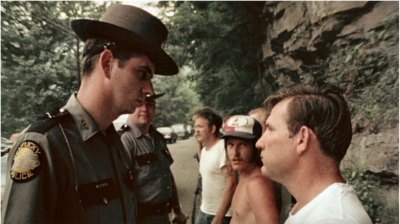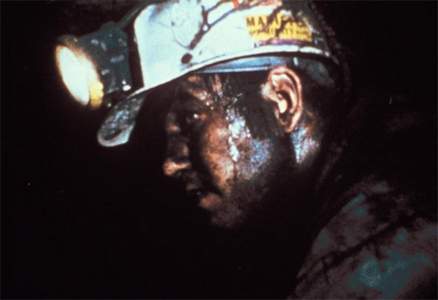
While watching the film/documentary "Harlan County U.S.A.," Directed by Barbara Kopple, it really got me thinking if unions are really valuable, especially when dealing with big business corporations. For starters, whenever anyone thinks of unions, i.e. someone who is not in a union and or someone who has never been in one, they can usually get the assumption that they are for the poor, minimum wage, working class people in the country. It is easy to see, especially when workers go on strike. The workers are seen as radical, annoying, whiny or someone who complains all the time, and people who are asking for to much. After all of the strikes that happen, with the picket lines, and publicity the workers are trying to get out there, in the end does it really do anything? From what I saw in the film, it was made pretty clear that no matter what workers ask for, the big business never has to give up much, if at all very little, and the workers fighting give up pretty much everything for a paid day off on your birthday and a $0.25 raise.

The problem is that big corporations have all the power. It disgusts me to think that those hard working miners in the film work so hard everyday, and they obtain health problems, and for what? To keep the CEO of Duke Power Co., and all the other men who get to wear suits and ties to work living comfortably. It allows the rich to get richer, and the poor to get poorer. I think I am getting ahead of my self here, and that I should start from the beginning of the film, to help solidify my points and get back on topic.

At the very beginning, you as the viewer, are put into the perspective of a miner. You show up at work in the morning, hop on the conveyor belt, and get whisked away into the deep, dark earth. I personally could never send myself head first down into the earth, in such a tight passage. They have to lay so low to the ground because if they lifted their heads any higher, they would hit the ceiling of rocky earth above them, and hurt themselves. They are then shown working in an area so dark, that even their lights on their helmets produce very little light that they are pretty much pointless to use. You see them re-stabilizing the ground above them so it doesn't collapse on them, and blowing up more areas of the ground to search for more coal to keep the owner of the company richer. At the end of their shifts they come out of the mine looking as black as the darkness they work in. They are covered in coal dust. Among working in a setting like this, they are also slowly acquiring major respiratory problems that will effect them later on: the most common is Black Lung, which you can only get by breathing in coal dust, and it can kill you.

So would the CEO or owner of Duke Power work a day in the mine with its workers? Probably not. However, if they did, or if they too were miners before becoming the person in charge of the company, I am sure that there would be no need for a union. The miners would be making (at least in the 70's when this was filmed) $10 an hour if not more. They would be working in safer conditions, as well as having the right equipment provided for them to prevent respiratory diseases later on. They would have all major holidays off, and paid for. They would have full benefits for themselves and their families, and lastly they would not be living in shacks that lack running water, and that could topple over at any minute. They probably also would not be living in the upgraded trailer. They would probably be living in really modest homes that have heat and running hot water. It is the 70's after all, I mean really, who wants to live in a barn? But what CEO or wants that? That would lower his bank account 20% (this figure I am just assuming makes the most sense to what is stated above), and all the men in suits and ties would have to have pay cuts.

This is where the unions step in and why they were created. All the miners that are union workers in the film, identify themselves as UMWA, United Mine Workers of America. The union employs people who can be the spokesperson for the miners, and they then go in and negotiate contracts based on what the miners want to do their job happily. If all of them feel they are underpaid, work in poor, unsafe conditions, or want specific benefits, they go to the union, and it is the unions job to speak up for the miners, especially since they are receiving part of their pay from each pay check. Since all big corporations hate unions, because they are there to take more of their money to give to the workers, they will fight their hardest to not give anything if little at all to the workers. When the contract is being negotiated, and not running as smoothly as expected, workers are encouraged to strike on the picket line. This helps draw in publicity in hopes of compromising a deal with the corporations. Here it seems as if unions really are valuable. They seem to have the miners best interests at heart.

While strikes are occurring, the company is losing money, because their business is not being run as productively as before. This helps create a speedier contract compromise. However, in the case of the Harlan County Miners in the movie, that was not the case. All of the miners, including wives who stood proudly behind their husbands, and sisters, and anyone else who was for the miners went on strike for 13 months. They were told by the union representatives to stand on the picket line and defend your rights, and they continually did so, even after they were being shot at and beaten by "gun thugs." They were seen as radicals, and were constantly pushed around by the law for trying to stop "scabs" going to work in the mines while striking. It is easy to see that their intentions are harmless. They just want to educate people on their situation. But no one really seemed to care especially the cops. It took 13 months for a contract to finally be negotiated, but that was only because Lawrence Jones had to be shot and killed to put an end to the on-going strikes. At that point in the film is when I started wondering if the union was really doing anything to really protect the miners it housed a voice for, and if they really were valuable? Especially when their cost of living goes up 7%, their wages go up 4%, and the production of coal, which they all work to produce, goes up 170%.

It is a debatable topic. I am still going back and forth in deciding. I think that in the case of the movie, their union did the best that they could. I think that all unions do the best that they can. Unfortunately, because they have to fight with big corporations who are trying to save all the money they can (for themselves), by hiring workers at a low pay, giving them little benefits, and working them in poor conditions for as long as they can. I wish that unions were more public with the treatment of all workers working for them, instead of only when strikes occur. If they educated the public more with how workers are treated inside companies, maybe there would be more sympathy for all the hard workers of the world. If this happened maybe miners would finally get the respect and treatment they deserve.
All pictures courtesy of Google Images


Nice analysis of this film, and discussion of the bigger picture of the effectiveness of unions.
ReplyDeleteWhen unions were stronger, they were responsible for most of the workers rights and benefits we now take for granted, such as pensions, the 5 day work week, etc. Here's a video that satirizes this: http://www.youtube.com/watch?v=184NTV2CE_c
Thank you, I will definitely have to check it out!
ReplyDelete